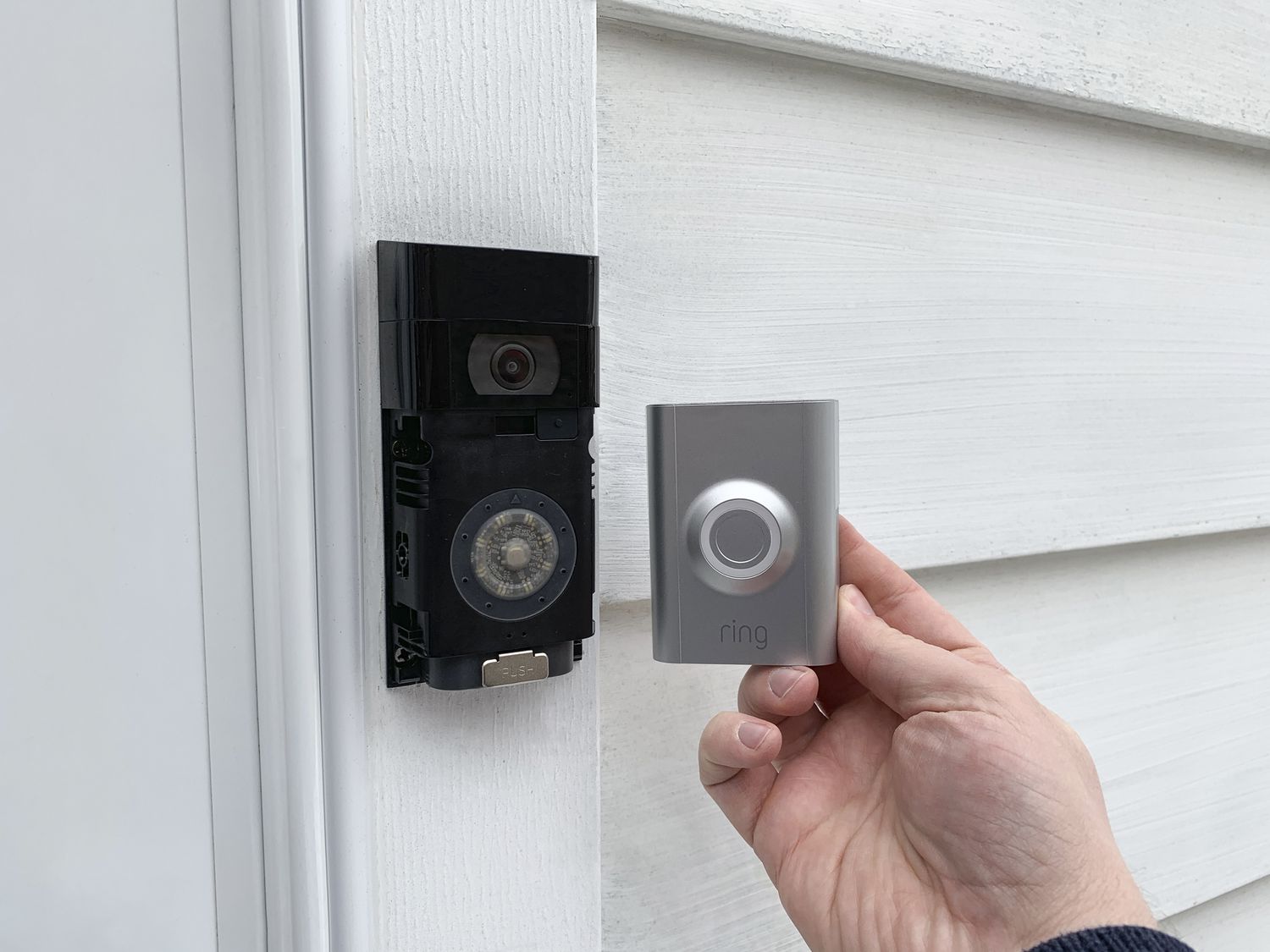

Articles
Who Owns The Ring Doorbell
Modified: October 20, 2024
Discover articles about who owns the Ring Doorbell and get insights into this popular home security device. Explore ownership details, features, and more.
(Many of the links in this article redirect to a specific reviewed product. Your purchase of these products through affiliate links helps to generate commission for Storables.com, at no extra cost. Learn more)
Introduction
The Ring Doorbell has revolutionized home security and become a staple in many households. With its advanced features and convenience, it offers homeowners increased peace of mind and a heightened sense of security.
However, as the popularity of the Ring Doorbell continues to grow, questions arise regarding who actually owns the device and the potential implications this may have on user privacy and data ownership. In this article, we will delve into the complexities surrounding the ownership of Ring Doorbell and shed light on the relationship between Ring and Amazon.
Furthermore, we will explore the controversies surrounding Ring Doorbell ownership and address the privacy concerns raised by users. Additionally, we will analyze the legal aspects that govern the use of Ring Doorbell, namely the terms of service and the user agreement.
By the end of this article, you will have a comprehensive understanding of the ownership rights and privacy implications associated with using a Ring Doorbell.
Key Takeaways:
- Owning a Ring Doorbell comes with privacy concerns and legal considerations. Users should understand data ownership, review privacy policies, and stay informed about potential implications for their personal privacy.
- The relationship between Ring and Amazon has expanded accessibility and functionality, but users must be aware of potential data sharing and privacy implications. Understanding the terms of service and user agreement is crucial for navigating ownership responsibly.
Read more: Who Invented Ring Doorbell
Evolution and Features of Ring Doorbell
The Ring Doorbell, created by Jamie Siminoff in 2012, has evolved from a simple video doorbell to a comprehensive home security system. The initial goal was to provide homeowners with a convenient way to monitor their front doors and enhance security. Over the years, Ring has added several features to meet the evolving needs of its users.
One of the standout features of the Ring Doorbell is its motion-activated video recording. When someone approaches the door, the device automatically starts recording, providing users with a visual record of anyone who comes to their door. This feature allows homeowners to keep an eye on their property even when they are away.
Another notable feature is the two-way audio system. This allows users to communicate with whoever is at the door, whether it’s a delivery person, a visitor, or a potential intruder. The ability to speak through the device adds an extra layer of security and convenience.
In addition to these fundamental features, Ring has expanded its product line to include a range of devices such as indoor and outdoor security cameras, floodlight cameras, and even a security system. These devices can all be connected and controlled through the Ring app, giving users a comprehensive home security solution.
Moreover, Ring has introduced various subscription plans to enhance the functionality of its devices. These plans offer features like cloud storage for video recordings, advanced motion detection, and professional monitoring services. Users can choose the plan that best fits their needs and takes their home security to the next level.
Overall, the Ring Doorbell has come a long way since its inception, offering users a robust suite of features to protect their homes and keep them connected to their front doors. Its continuous innovation and commitment to improving security have made it a leader in the home security industry.
The Relationship between Ring and Amazon
One significant aspect of the Ring Doorbell’s ownership lies in its relationship with Amazon. In 2018, Amazon acquired Ring, integrating the smart home security company into its ecosystem of products and services. This partnership has both advantages and implications for Ring Doorbell owners.
The acquisition has allowed Ring to leverage Amazon’s vast resources and distribution network, resulting in increased accessibility and availability of Ring products. It has also paved the way for seamless integration with other smart home devices and services supported by Amazon, such as Alexa voice commands.
With the integration of Ring into Amazon’s ecosystem, users can now access and control their Ring devices through the Amazon Echo devices. This feature not only provides convenience but also expands the functionality and ease of use for Ring Doorbell owners.
Furthermore, the partnership with Amazon has significantly expanded Ring’s customer base and market reach. With Amazon’s extensive customer network and global presence, Ring products have gained wider visibility and accessibility, making them more accessible to consumers worldwide.
However, the relationship between Ring and Amazon has also raised concerns regarding data privacy and potential data sharing. As part of the acquisition, Ring gained access to Amazon’s data infrastructure, which has raised questions about how user data is handled and whether it is shared with or utilized by Amazon.
While Ring has stressed its commitment to user privacy, it is crucial for Ring Doorbell owners to familiarize themselves with the data usage and privacy policies implemented by both Ring and Amazon. Understanding the terms and conditions, as well as the data sharing practices, will help users make informed decisions about their data privacy and ownership rights.
Overall, the relationship between Ring and Amazon has positively impacted the availability and functionality of Ring Doorbell products. However, it is important for users to be aware of the potential implications for data privacy and ownership and take necessary precautions to protect their personal information.
Controversies Surrounding Ring Doorbell Ownership
While the Ring Doorbell has gained widespread popularity for its innovative features and enhanced security, it has also sparked controversies surrounding ownership and its impact on privacy. Several key concerns have emerged in relation to the use of Ring Doorbell products.
One controversy revolves around the data collection and storage practices of the Ring Doorbell. Ring devices capture audio and video recordings, which are stored in the cloud. This has raised concerns about the potential misuse or unauthorized access to these recordings. Critics argue that the constant surveillance and data collection infringe upon individuals’ privacy rights.
Another point of contention is the relationship between Ring and law enforcement agencies. Ring has partnered with numerous police departments across the United States, allowing law enforcement to request access to users’ video footage. While the aim is to enhance community safety, critics argue that this partnership raises concerns about consent and potential misuse of surveillance capabilities.
Furthermore, there have been reports of security breaches and incidents where unauthorized individuals gained access to Ring accounts, enabling them to access live video feeds and potentially compromise the privacy and security of users. These incidents highlight the need for robust security measures to protect user accounts and data.
Additionally, concerns have been raised about the potential for racial profiling and targeted surveillance. The nature of Ring Doorbell’s motion detection and video recording capabilities could result in disproportionate monitoring of certain communities or individuals, leading to discriminatory practices and privacy violations.
Moreover, the impact on public spaces and collective privacy is another aspect of the ownership controversy. As Ring Doorbell users often have their devices facing the street, it raises questions about the surveillance of public areas without individuals’ consent and the potential erosion of collective privacy norms.
It is important to acknowledge that Ring has made efforts to address these concerns. The company has implemented features such as end-to-end encryption and two-factor authentication to enhance security and protect user privacy. They have also introduced initiatives to provide users with more control over their data and sharing practices.
However, it is crucial for Ring Doorbell owners to be aware of these controversies and engage in critical discussions surrounding privacy, surveillance, and data ownership. Understanding the risks and taking appropriate precautions can help mitigate the potential drawbacks and protect personal privacy.
When setting up a Ring Doorbell, make sure to register the device to your own personal account to ensure that you are the rightful owner and have full control over its features and settings.
Privacy Concerns and Ownership Rights
Privacy concerns have been at the forefront of the discussions surrounding the Ring Doorbell’s ownership. As a device that constantly captures audio and video recordings, it raises questions about the potential invasion of individuals’ privacy and the ownership rights associated with these recordings.
One of the primary concerns is the collection and storage of personal data by the Ring Doorbell. The device records video footage and audio whenever there is motion detected, creating a database of potentially sensitive information. This data can include images of individuals, conversations, and even details about daily routines, posing a risk to personal privacy if it falls into the wrong hands or is used for unauthorized purposes.
Additionally, there is apprehension regarding the ownership of the recorded data. Who has the rights to the recorded footage – the user, the company (Ring), or potentially law enforcement agencies? This uncertainty raises questions about individuals’ control over their own data and the potential for third-party access without explicit consent.
Furthermore, the integration of Ring with Amazon has sparked concerns about data sharing and the potential for targeted advertising based on user behavior and preferences. Users may worry about their data being utilized for marketing purposes or shared with other entities without their knowledge or consent.
To address these concerns, it is important for users to review and understand the terms of service and privacy policies provided by Ring. These documents outline the company’s practices regarding data collection, storage, and sharing. By familiarizing themselves with these policies, users can make informed decisions about their privacy and determine their comfort level with the ownership and control of their data.
Additionally, it is crucial to take steps to protect personal privacy while using the Ring Doorbell. This includes regularly reviewing and adjusting privacy settings, ensuring strong passwords and two-factor authentication, and keeping software and firmware up to date to safeguard against potential security vulnerabilities.
It is also essential to stay informed about updates in privacy laws and regulations that govern the usage of smart devices and the handling of personal data. Being aware of legal provisions can arm individuals with the knowledge to assert their ownership rights and take appropriate action if their privacy is violated.
Ultimately, the issue of privacy concerns and ownership rights surrounding the Ring Doorbell requires individuals to actively engage in discussions about data privacy, surveillance, and their rights as users. By staying informed, taking necessary precautions, and advocating for stronger privacy protections, individuals can assert their ownership rights and safeguard their personal privacy.
Read more: Who Can Install Ring Doorbell
Legal Aspects: The Terms of Service and User Agreement
When using the Ring Doorbell, it is important to familiarize yourself with the legal aspects outlined in the terms of service and user agreement. These documents lay out the rights and responsibilities of both the user and the company, establishing a framework for the ownership and usage of the Ring Doorbell.
The terms of service and user agreement typically cover various aspects, including the scope of the services provided, limitations on usage, intellectual property rights, privacy policies, and dispute resolution mechanisms. It is essential to carefully read and understand these terms in order to make informed decisions and protect your rights as a user.
One key aspect addressed in these legal documents is the ownership of the device and the data it captures. Generally, the Ring Doorbell is owned by the user, but the data collected may be subject to the terms and conditions outlined by Ring. It is important to review the ownership rights and data usage policies to understand how your personal data is handled, stored, and potentially shared.
The terms of service and user agreement also outline the limitations and restrictions on the usage of the Ring Doorbell. These restrictions may include prohibitions on illegal activities, unauthorized modifications to the device, and misuse of the data captured by the device. By adhering to these restrictions, users can protect themselves legally and avoid potential legal consequences.
Intellectual property rights are another critical aspect addressed in the legal documents. These rights protect the trademarks, copyrights, and patents associated with the Ring Doorbell. Users are typically prohibited from reproducing, modifying, or distributing these intellectual properties without proper authorization. Respecting these rights ensures compliance with the legal framework and safeguards against potential legal disputes.
Moreover, the terms of service and user agreement govern the resolution of disputes between the user and Ring. They may outline procedures for dispute resolution, including arbitration or mediation processes. Understanding these mechanisms is crucial for users to navigate potential conflicts or disagreements with the company in a fair and efficient manner.
It is important to note that the terms of service and user agreement may be updated or modified by the company from time to time. As a user, it is your responsibility to stay informed about any changes and review the updated terms to ensure continued compliance and protection of your rights.
By understanding and adhering to the terms of service and user agreement, users can navigate the legal aspects of owning and using the Ring Doorbell responsibly. Being aware of your rights, limitations, and privacy policies empowers you to make informed decisions and protect your interests in the digital landscape.
Conclusion
The ownership of Ring Doorbell is a multifaceted topic that encompasses privacy concerns, data ownership, and legal aspects. Throughout this article, we have explored the evolution and features of Ring Doorbell, the relationship between Ring and Amazon, controversies surrounding ownership, privacy concerns, and the legal aspects outlined in the terms of service and user agreement.
The Ring Doorbell has undoubtedly transformed home security by providing homeowners with innovative features and increased convenience. Its motion-activated video recording, two-way audio system, and integration with Amazon’s ecosystem have made it a popular choice for many households.
However, the ownership of Ring Doorbell raises important considerations regarding user privacy and data ownership. Privacy concerns revolve around data collection, storage, and potential unauthorized access. The relationship between Ring and law enforcement agencies also raises questions about consent and surveillance practices.
Understanding the legal aspects outlined in the terms of service and user agreement is crucial for Ring Doorbell owners. These documents clarify the rights and responsibilities of both the user and the company, including ownership rights, usage restrictions, intellectual property rights, and dispute resolution mechanisms.
While Ring has taken steps to address privacy concerns and enhance security, it is essential for users to stay informed about data privacy practices, review and adjust privacy settings, and take necessary precautions to protect their personal information.
In conclusion, the ownership of Ring Doorbell brings together a complex mix of technological advancements, privacy concerns, and legal considerations. By staying informed, understanding the terms of service, and actively advocating for privacy rights, individuals can navigate the ownership landscape responsibly and maintain control over their data and personal privacy.
As technology continues to evolve, the ownership and privacy landscape will inevitably evolve with it. It is crucial for users, companies, and policymakers to engage in ongoing discussions to strike a balance between convenience, security, and user privacy.
Frequently Asked Questions about Who Owns The Ring Doorbell
Was this page helpful?
At Storables.com, we guarantee accurate and reliable information. Our content, validated by Expert Board Contributors, is crafted following stringent Editorial Policies. We're committed to providing you with well-researched, expert-backed insights for all your informational needs.















0 thoughts on “Who Owns The Ring Doorbell”